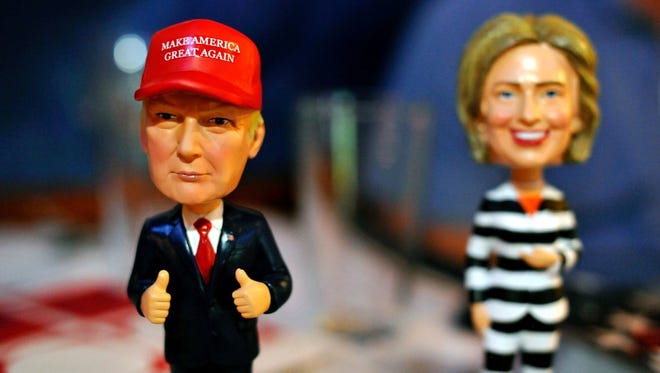Analysis: Trump's Muslim ban 'morphs' into 'extreme vetting'

By his own admission, Republican presidential nominee Donald Trump's plan to combat the threat of Islamic extremism by banning all Muslims from entering the United States has "morphed" into "extreme vetting."
The shift was highlighted during Sunday's debate with Democratic nominee Hillary Clinton. Moderator Martha Raddatz asked Trump whether his call — following the mass shooting in San Bernardino, Calif., by Islamic State sympathizers — for barring Muslim immigrants from the U.S. "until our country's representatives can figure out what is going on," was the right thing to do.
"The Muslim ban is something that in some form has morphed into extreme vetting from certain areas of the world," Trump responded.
"We are going to areas like Syria, where they're coming in by the tens of thousands because of Barack Obama and Hillary," he said Sunday night in St. Louis.
Things got ugly — and then uglier: Top takeaways from Clinton-Trump II
Trump said Clinton, by contrast, wants to pursue an immigration policy that would allow a 550% increase of Syrian asylum seekers into the U.S. over what President Obama has advocated.
"This is going to be the great Trojan horse of all time. We have enough problems in this country. I believe in building safe zones. I believe in having other people pay for them. As an example, the Gulf states who are not carrying their weight but they have nothing but money," Trump continued.
"But I don't want to have — with all the problems this country has and all of the problems you see going on, hundreds of thousands of people coming in from Syria when we know nothing about them. We know nothing about their values and we know nothing about their love for our country."
Analysis: She called him a misogynist. He said she should go to jail.
The U.S. admitted 12,587 Syrians for the 2016 fiscal year that end on Sept. 30, according to a refugee database used by the State Department — an amount that exceeds Obama's goal by 25%. Clinton has said that the U.S. should accept 65,000 Syrian refugees, a figure that matches Trump's "550%" assertion but is well below his subsequent "hundreds of thousands" claim. Overall, from all regions, the U.S. accepted 85,000 refugees this fiscal year, a 57% increase from 2015.
The length of time it takes for a refugee to be resettled in the U.S. varies depending on the applicant's location and circumstances. The average is 18-24 months, according to the State Department. The process typically begins after an asylum seeker's case is referred to a State Department Resettlement Support Center (RSC) from the United Nations High Commissioner for Refugees. The RSC then collects biographical and other information about the applicant and shares it with the Department of Homeland Security and other U.S. government security agencies for review. Each refugee is then interviewed in person. Those approved are given a health check. Finally, the RSC requires that approved refugees enter into a resettlement program for practical support and cultural orientation.
During the debate, Clinton said she was in favor of "vetting that is as tough as it needs to be," but that it was important "as a policy, not to say, as Donald has said, that we're going to ban people based on a religion. How do you do that? We are a country founded on religious freedom and liberty? How do we do what he has advocated without causing great distress within our own country? Are we going to have religious tests when people fly into our country?"
MORE COVERAGE OF THE SECOND PRESIDENTIAL DEBATE
- Opinion: Donald Trump's cowardly debate performance
- Trump's pacing, lurking turned into a thing
- Trump vows to throw Clinton in jail over emails
- Here's what Trump said at the debate about 2005 tape
Although officials say that Muslims in the U.S. regularly report suspicious activity — "Some of our most productive relationships are with people who see things and tell us things who happen to be Muslim," FBI Director James Comey said after the Orlando nightclub attack — Trump said Sunday: "We have to be sure that Muslims come in and report when they see something."
That comment unleashed a stampede of reaction from American Muslims, including a popular tweet from Moustafa Bayoumi, who wrote: "I'm a Muslim, and I would like to report a crazy man threatening a woman on a stage in Missouri."
